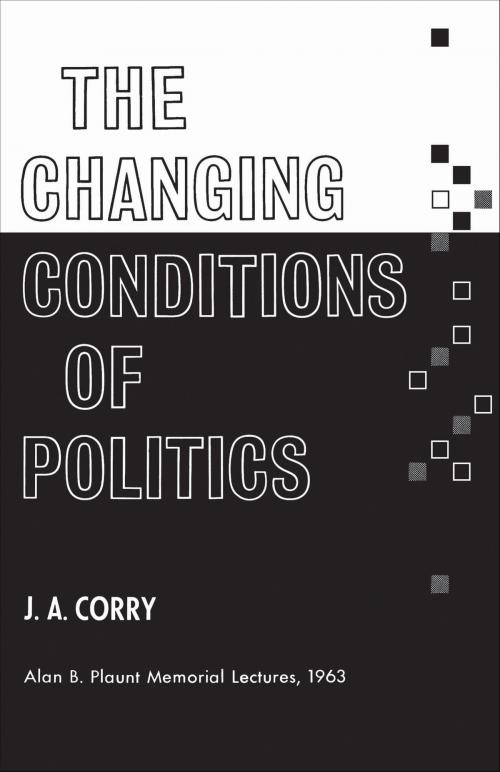The Changing Conditions of Politics
Nonfiction, Social & Cultural Studies, Political Science, Politics, History & Theory| Author: | James Corry | ISBN: | 9781442637719 |
| Publisher: | University of Toronto Press, Scholarly Publishing Division | Publication: | December 15, 1963 |
| Imprint: | Language: | English |
| Author: | James Corry |
| ISBN: | 9781442637719 |
| Publisher: | University of Toronto Press, Scholarly Publishing Division |
| Publication: | December 15, 1963 |
| Imprint: | |
| Language: | English |
J.A. Corry, one of Canada's outstanding political scientists, in the Alan B. Plaunt Lectures for 1963 has contributed a brilliant and provocative analysis of the changed world in which politics and students of politics must operate today. He suggests first that political studies can no longer be confined to the frame long held adequate. The eighteenth-century view of man as essentially rational suited an age of individualism and liberal optimism but is inadequate for politics in our mass society: here theology has something to contribute. Political science has in the past confined its attention to the operation of governments and political parties but has not for this age taken enough account of the influence of the social structure as a whole on political behaviour: here is where sociology may speak. With this background Principal Corry talks of the difficulties of understanding our present-day political ideas and theories hitherto usually relied on for the purpose. He goes on to look at some aspects of the collectivist, mass society we live in today and to consider how far these may be producing new dimensions in political behaviour.
There is abroad today a mood of disenchantment and frustration because politics has disappointed us but ironically this mood may endanger such recovery of control as is open to us. Effective power is being gathered into relatively few hands. In this society where will the individual find confidence and self-reliance and a sense of responsibility? We face a dilemma in "the end of ideology," in the slipping of convictions about what can be achieved through politics, and this affects both governments, politicians and individuals. Answers to the many questions about human nature and society which this dilemma presents are not easy to find, but must be sought. The skill and power with which Principal Corry has marshalled the questions ensure our attention and concern.
J.A. Corry, one of Canada's outstanding political scientists, in the Alan B. Plaunt Lectures for 1963 has contributed a brilliant and provocative analysis of the changed world in which politics and students of politics must operate today. He suggests first that political studies can no longer be confined to the frame long held adequate. The eighteenth-century view of man as essentially rational suited an age of individualism and liberal optimism but is inadequate for politics in our mass society: here theology has something to contribute. Political science has in the past confined its attention to the operation of governments and political parties but has not for this age taken enough account of the influence of the social structure as a whole on political behaviour: here is where sociology may speak. With this background Principal Corry talks of the difficulties of understanding our present-day political ideas and theories hitherto usually relied on for the purpose. He goes on to look at some aspects of the collectivist, mass society we live in today and to consider how far these may be producing new dimensions in political behaviour.
There is abroad today a mood of disenchantment and frustration because politics has disappointed us but ironically this mood may endanger such recovery of control as is open to us. Effective power is being gathered into relatively few hands. In this society where will the individual find confidence and self-reliance and a sense of responsibility? We face a dilemma in "the end of ideology," in the slipping of convictions about what can be achieved through politics, and this affects both governments, politicians and individuals. Answers to the many questions about human nature and society which this dilemma presents are not easy to find, but must be sought. The skill and power with which Principal Corry has marshalled the questions ensure our attention and concern.















